
The general election was gruesome! News stories were bent to fit a partisan press, there was outrageous spinning by political parties, the dodging of difficult questions and avoiding television interviews by party leaders. It all culminated in a row over the way a four-year-old boy was treated in a Leeds hospital and reached its nadir with fake news on social media claiming the whole story was staged despite it being checked out first by the Yorkshire Post and then the Mirror. Respected journalists were caught out by tweeting news from cynical anonymous political sources which later proved to be lies and provoked an online onslaught on the “mainstream media” for alleged bias.
What a relief it was to get away from fake news to real news as the British Journalism Awards, organised by Press Gazette for the eighth year, celebrated the best of UK journalism. Proper campaigning and investigative journalism in the public interest that speaks up for people without a voice and exposes the vices of the powerful.
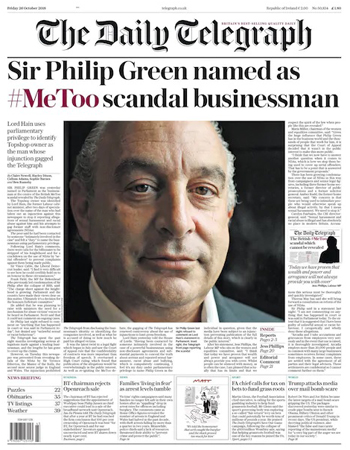
Stories like the ‘MeToo’ scandal by Claire Newell and the Telegraph investigation team, which took on Top Shop tycoon Sir Philip Green and his libel lawyers to speak up for women who were sexually harassed. It won the Investigation of the Year. Green has long had a reputation for ranting at journalists and threatening to call the proprietors of their newspapers to get stories about him spiked. The BJA judges said: “The Telegraph fought through the courts for the right to tell this story against a wealthy and powerful opponent in Philip Green – one of the most litigious people in business. This was brave journalism which required a huge amount of impressive research and a good deal of dogged determination to see it through.” Newell praised the Telegraph’s lawyers and all the “door-knocking” by her team to persuade victims to speak up. The Telegraph’s investigation also represented a victory over non-disclosure agreements which are often used to gag staff and stop them taking their legitimate grievances to the media. Here are some of the other BJA winners:
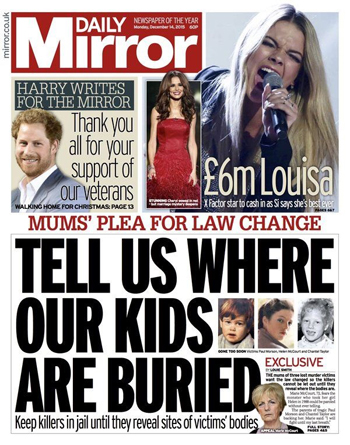
Campaigns
Sometimes a campaign takes years to reach its goal. The Mirror’s Fiona Duffy and Louie Smith won Campaign of the Year for ‘Helen’s Law’, which aims to change the law so that killers who refuse to reveal where they have left victims’ bodies will be denied parole. It is named after Helen McCourt who was murdered in 1988. Duffy first came across the story when working for the Liverpool Echo and has campaigned alongside Helen’s mother, Marie McCourt, for over 20 years. The Mirror splashed on the campaign in 2015 and in October, the government introduced a bill which would place a legal duty on the Parole Board to consider the cruelty of killers who refuse to give the location of a victim’s remains when considering their release. The bill was reintroduced after the election but was not passed before Helen McCourt’s killer Ian Simms was released from jail in February. Duffy says: “Seeing this law enter the statute books will be the proudest moment of my 30-year career as a journalist.” The BJA judges said: “This was campaigning journalism at its best. Fiona Duffy stuck with this story like a limpet over many years and has achieved a result.”
In contrast, a highly commended campaign by the Daily Mail under the banner ‘Let’s Give Our Hospitals a Helping Hand’ aimed at getting readers to help out at their local hospitals got a remarkably quick reaction with 32,500 volunteers coming forward within 30 days. The Mail teamed up with the NHS Helpforce volunteering charity and asked readers to make a simple pledge to help their local NHS hospital by offering three hours a week or one day a month of their time.
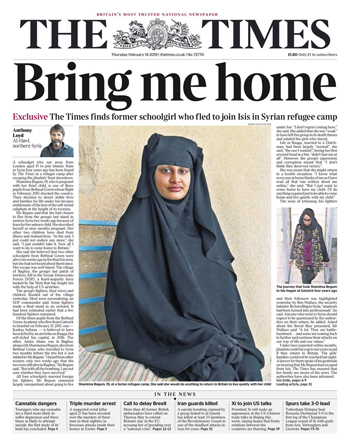
Scoops
Scoop of the Year went to Anthony Loyd of The Times for his exclusive in tracking down ISIS bride Shamima Begum, the schoolgirl from Bethnal Green, in a Syrian refugee camp where she told him she wanted to come home. Judges described it as a “standout world exclusive” that was “so big, everyone had to follow it”. Other standout scoops up for the award included the Mail on Sunday’s leak of the UK’s ambassador to the US Sir Kim Darroch’s cables giving his bluntly candid views on Donald Trump, the Sunday Times’ publication of Whitehall’s secret no-deal Brexit preparations and the Guardian’s exclusive on police being called after a row between Boris Johnson and his girlfriend at her flat.
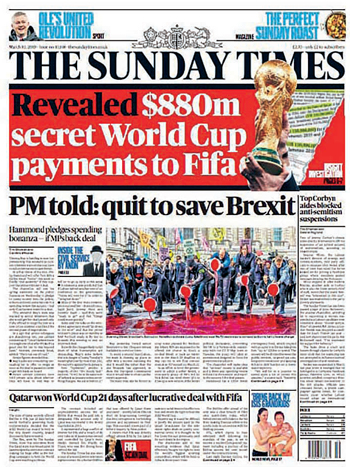
Sports journalism
The sports journalism category contained some of the very best investigative journalism. It was won by Jonathan Calvert and George Arbuthnott of the Sunday Times Insight team for its exclusive investigation into Qatar’s secret $880 million World Cup payments to FIFA and the revelations that Russia was facing a ban from the Olympics over fresh doping allegations. The BJA judges said: “These were astonishing stories with ongoing global impact. It was classic Sunday Times Insight journalism – they held their nerve and refused to back off.” Among the other finalists was the Daily Mail Sportsmail team which broke the story of Saracens Rugby Club breaking the salary cap rules which led to the club being £5.3 million and demoted from the Rugby Premiership.
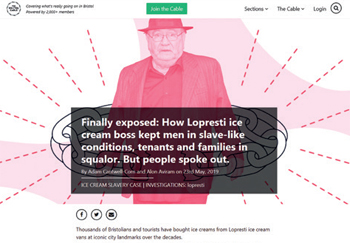
Local journalism
A five-year investigation by The Bristol Cable, a community-led media co-operative in Bristol, led to modern day slavery charges against the boss of an ice cream and property company. The Cable revealed there were men living like slaves under Salvatore Lopresti’s control, and a trail of workers and tenants exploited by the Lopresti ice cream and property business. The Bristol Cable is distributed free and raises funds through a membership scheme. BJA judges gave The Bristol Cable the Local Journalism Award and said: “A compelling and impressive investigation which got results. The Bristol Cable’s reporting team stuck to this story with grit and determination.” Another finalist was the Impartial Reporter local newspaper in Northern Ireland which succeeded in getting more than 70 possible child sex abuse victims to come forward and tell their story, prompting a police investigation into an alleged paedophile ring.
Journalist of the Year
Documentary filmmaker Robin Barnwell was named Journalist of the Year and won the Foreign Affairs Journalism Award for his work with ITV Exposure and Hardcash Productions, exposing China’s use of detention camps for Muslims and the battle against oppression of women in Iran. Judges praised his impressive undercover work to shine a light into secretive overseas regimes. They added: “Barnwell gave a voice to the voiceless and fulfilled journalism’s central purpose of comforting the afflicted and afflicting the comfortable.”
News Provider of the Year
The Financial Times became the first newspaper to win the British Journalism Awards News Provider of the Year prize two years in a row. The FT also won the awards for technology and political journalism. The judges said the FT “combines consistent high quality journalism across is various platforms with an enviable ability to secure jaw-dropping exclusives and has also been at the forefront of journalism innovation and proved that it is possible turn a profit whilst investing in quality.” The award was seen as a fitting tribute to the highly respected Lionel Barber who decided to stand down as editor of the FT after fourteen years.
The News Provider category had only one new media contender, the HuffPost UK. Other than the Financial Times, it was the other old established big beasts of the national newspaper world that were in contention: the Guardian, the Sunday Times, the Telegraph, Daily Mail, the Mirror and the Times.
Tim Walker, a BJA judge and former Telegraph colleague of Boris Johnson enlivened the evening with a special plea calling for “a law to be enforced with immediate effect that would make it illegal for journalists to become politicians, enforceable retrospectively.” He made his own contribution to the cause of no journalists in Parliament by standing down as prospective Liberal Democrat candidate in Canterbury in favour of the sitting Labour MP.
Jeremy Corbyn claimed after the election: “What was it about our plans to make the super-rich pay their fair share that the billionaire press barons didn't like?” It seemed a sour “let’s blame the media” response to Labour’s catastrophic defeat. In victory, the Conservatives surprisingly continued its boycott of the BBC’s Today programme and other broadcasters and then picked a fight with the media by offering No 10 briefings to selected journalists. This prompted a walkout by lobby journalists and claims the prime minister’s aides were trying to copy Trump by only dealing with friendly media.
Never mind the politicians. What the campaigns and investigations highlighted by the BJAs show is that there is plenty of good public interest journalism from big national titles, regional newspapers, national and regional broadcasters, news agencies and the new media like Bristol Cable, Tortoise, HuffPost, BuzzFeed and the Bureau of Investigative Journalism as well as magazines like Computer Weekly, The Economist and Health Service Journal. Some have billionaire owners, most don’t.
Anyway, it is condescending to see journalists as merely the servants of billionaires. Who else has taken on business tycoons, knighted by politicians? Who else has exposed the corruption at FIFA, the doping by Russia of its athletes, modern day slavery, China’s use of detention camps for Muslims, published the secret Brexit preparation plans, tracked down the British Isis brides and won campaigns to change the law? After some of the shame of the election coverage, the British Journalism Awards was a night to be proud of what the best journalists and media can achieve.
The last word should go to Press Gazette editor-in-chief Dominic Ponsford: “British Journalism is not perfect, and on occasion we all make mistakes, but no-one should doubt that the positive benefits of a vibrant free press immeasurably outweigh the negatives that are widely publicised by the vocal anti-press lobby.”
This article was first published in InPublishing magazine. If you would like to be added to the free mailing list, please register here.












